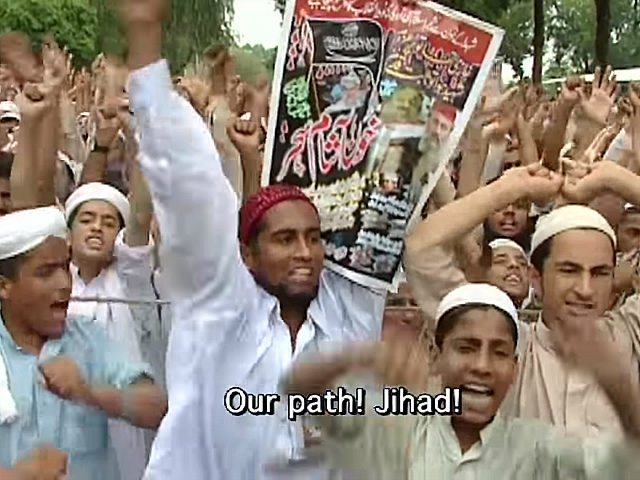The Pakistani government’s Central Board of Film Censors (CBFC), a regulatory body governing the film industry, has recently banned at least two documentaries on Islamic extremism.
Last week, Pakistan’s CBFC issued a notice that left the organizers of Islamabad’s Foundation for Arts, Culture & Education (FACE) 2016 Film Festival “scrambling at the last minute to fill holes in their schedule: two documentary films that were meant to be screened at the festival” after they were deemed “unsuitable for public exhibition” by the regulatory board, reports Dawn.
Meanwhile, a third documentary was axed by its producer “after the CBFC advised that cuts be made to his film before it was screened,” adds the report.
The two films that were judged by the government to be “unsuitable” for public consumption were identified as Among the Believers and Besieged in Quetta.
Directed by Hemal Trivedi and Mohammed Naqvi, Among the Believers has already been screened in over 20 countries and won 12 awards.
According to the CBFC notice, a review panel argued that Among the Believers contains “dialogues which projects (sic) the negative image of Pakistan in the context of ongoing fighting against extremism and terrorism.”
Regarding Besieged in Quetta, the regulatory body voiced a similar justification, saying it casts Pakistan in a “negative” light.
“The board offered no clear reason for the ban other than the claim that it portrays ‘the negative side of the country,'” reportedly said Asef Ali Muhammed, the film’s director, adding, “This is very vague, unclear reasoning.”
The name, plot, and reason for why the producer of the third film decided to self-censor is unclear. It appears the producer’s decision was driven by the CBFC’s suggestion that certain edits be made to the documentary before it was screened.
“These documentary films, Among the Believers and Besieged in Quetta clearly flout the Motion Picture Ordinance of 1979 and the Code of Censorship, 1980,” declared CBFC Chairman Mobashir Hassan, when asked to justify the government’s decision to censor the movies. “These laws are like the bible of censorship procedure.”
“A panel arranged by the CBFC reviewed these films, they were appealed, we reviewed them again. Still, the decision to not allow these films to air was unanimous,” he added.
The review panel consisted of a “diverse” group of members, including “journalists and members of civil society,” claimed the chairman.
Among the Believers features Abdul Aziz Ghazi, the infamous Islamic State supporter and radical cleric of one of Pakistan’s most notorious mosques and religious schools (madrassas), the Lal Masjid in Islamabad.
Directors Trivedi and Naqvi followed “Aziz’s quest to impose a strict version of Sharia law throughout the country. In his network of seminaries which provides free food and shelter, children as young as four years of age are radicalized. The film charts the lives of two of his teenage students who are pawns in his ideological war,” explains Pakistan’s Geo News.
Meanwhile, the documentary Besieged in Quetta sheds light on the the persecution and plight of the Hazara minority in Pakistan.
The Hazaras are overwhelmingly Shiite and have often been the victims of massacres carried out by the Taliban and most recently the Islamic State, also known as ISIS and ISIL, in the Afghanistan-Pakistan region.
“It’s a very straightforward documentary based on interviews of people who have lost their loved ones to terrorism in Quetta in the last 15 years,” said director and Hazara community member Asef Ali Muhammed.
“It’s beyond my understanding why we can’t reflect the reality of today’s Pakistan through the medium of a documentary,” he added.
Naqvi, one of the directors of Among the Believers, also expressed frustration at the board’s justification for banning the film.
“It’s a very nuanced story,” said Naqvi, according to Dawn. “In fact, I see it as a coming-of-age tale, one where you can see how the ideological divide in Pakistan is fostered and grows in childhood. We’ve devoted 5 years to this project, and it’s very representative of Pakistan.”
“I don’t understand the ban, and the reasons given for it were very unclear,” he continues. “One of the reasons set forth was that the documentary violates the National Action Plan, which is absurd.”
Adopted in 2015 after Taliban gunmen massacred more than 150 students and teachers at the Army Public School in Peshawar, the National Action Plan is aimed at combating terrorism and Islamic extremism.
The plan reportedly calls for “concrete measures against [the] promotion of terrorism through Internet and social media” and declares a “ban on [the] glorification of terrorists and terrorist organizations through print and electronic media.”

COMMENTS
Please let us know if you're having issues with commenting.